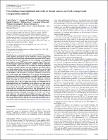| dc.contributor.author | O'Driscoll, Lorraine | en |
| dc.date.accessioned | 2014-10-14T15:17:24Z | |
| dc.date.available | 2014-10-14T15:17:24Z | |
| dc.date.issued | 2013 | en |
| dc.date.submitted | 2013 | en |
| dc.identifier.citation | Clarke C, Madden SF, Doolan P, Aherne ST, Joyce H, O'Driscoll L, Gallagher WM, Hennessy BT, Moriarty M, Crown J, Kennedy S, Clynes M., Correlating transcriptional networks to breast cancer survival: a large-scale coexpression analysis., Carcinogenesis, 34, 10, 2013, 2300 - 2308 | en |
| dc.identifier.other | Y | en |
| dc.identifier.uri | http://hdl.handle.net/2262/71510 | |
| dc.description | PUBLISHED | en |
| dc.description.abstract | Weighted gene coexpression network analysis (WGCNA) is a powerful 'guilt-by-association'-based method to extract coexpressed groups of genes from large heterogeneous messenger RNA expression data sets. We have utilized WGCNA to identify 11 coregulated gene clusters across 2342 breast cancer samples from 13 microarray-based gene expression studies. A number of these transcriptional modules were found to be correlated to clinicopathological variables (e.g. tumor grade), survival endpoints for breast cancer as a whole (disease-free survival, distant disease-free survival and overall survival) and also its molecular subtypes (luminal A, luminal B, HER2+ and basal-like). Examples of findings arising from this work include the identification of a cluster of proliferation-related genes that when upregulated correlated to increased tumor grade and were associated with poor survival in general. The prognostic potential of novel genes, for example, ubiquitin-conjugating enzyme E2S (UBE2S) within this group was confirmed in an independent data set. In addition, gene clusters were also associated with survival for breast cancer molecular subtypes including a cluster of genes that was found to correlate with prognosis exclusively for basal-like breast cancer. The upregulation of several single genes within this coexpression cluster, for example, the potassium channel, subfamily K, member 5 (KCNK5) was associated with poor outcome for the basal-like molecular subtype. We have developed an online database to allow user-friendly access to the coexpression patterns and the survival analysis outputs uncovered in this study (available at http://glados.ucd.ie/Coexpression/). | en |
| dc.format.extent | 2300 | en |
| dc.format.extent | 2308 | en |
| dc.language.iso | en | en |
| dc.relation.ispartofseries | Carcinogenesis | en |
| dc.relation.ispartofseries | 34 | en |
| dc.relation.ispartofseries | 10 | en |
| dc.rights | Y | en |
| dc.subject | Breast Cancer | en |
| dc.title | Correlating transcriptional networks to breast cancer survival: a large-scale coexpression analysis. | en |
| dc.type | Journal Article | en |
| dc.contributor.sponsor | Science Foundation Ireland (SFI) | en |
| dc.contributor.sponsor | Science Foundation Ireland (SFI) | en |
| dc.contributor.sponsor | Health Research Board (HRB) | en |
| dc.type.supercollection | scholarly_publications | en |
| dc.type.supercollection | refereed_publications | en |
| dc.identifier.peoplefinderurl | http://people.tcd.ie/lodrisc | en |
| dc.identifier.rssinternalid | 92864 | en |
| dc.identifier.doi | 10.1093/carcin/bgt208 | en |
| dc.rights.ecaccessrights | openAccess | |
| dc.contributor.sponsorGrantNumber | 08/SRC/B141 | en |
| dc.contributor.sponsorGrantNumber | 07/IN.1/B1323 | en |
| dc.relation.source | http://www.ncbi.nlm.nih.gov/pubmed/23740839 | en |
| dc.subject.TCDTheme | Cancer | en |
| dc.subject.TCDTag | Breast cancer | en |
| dc.subject.TCDTag | CANCER | en |
| dc.identifier.rssuri | http://www.ncbi.nlm.nih.gov/pubmed/23740839 | en |
| dc.identifier.orcid_id | 0000-0002-9860-8262 | en |




